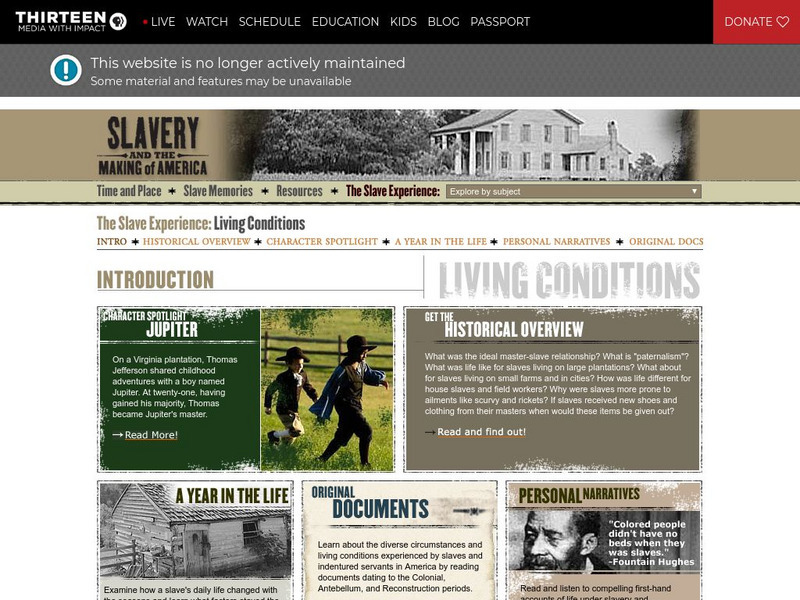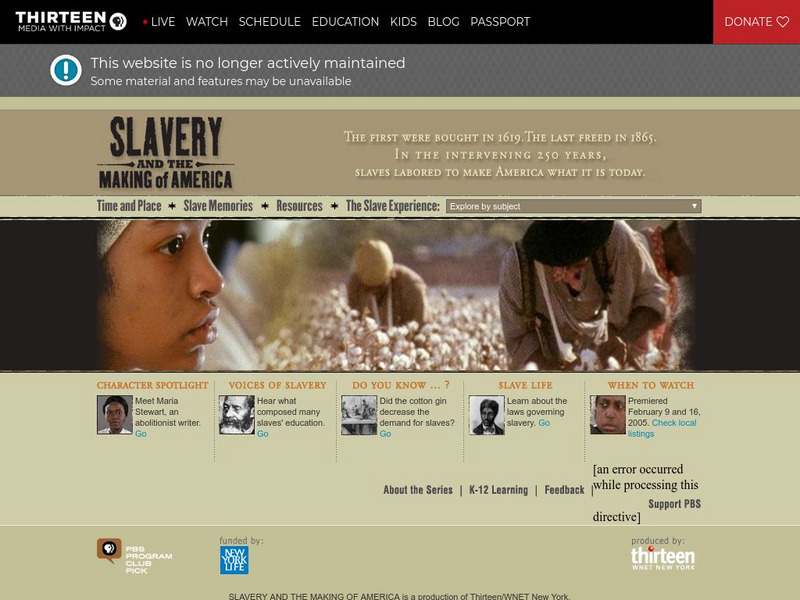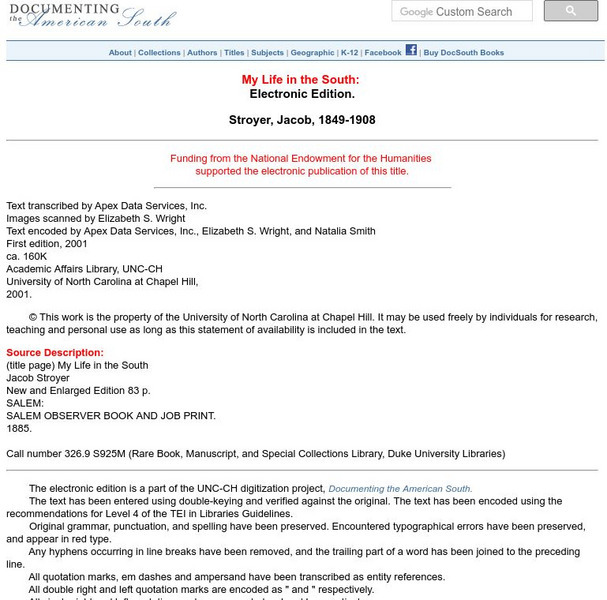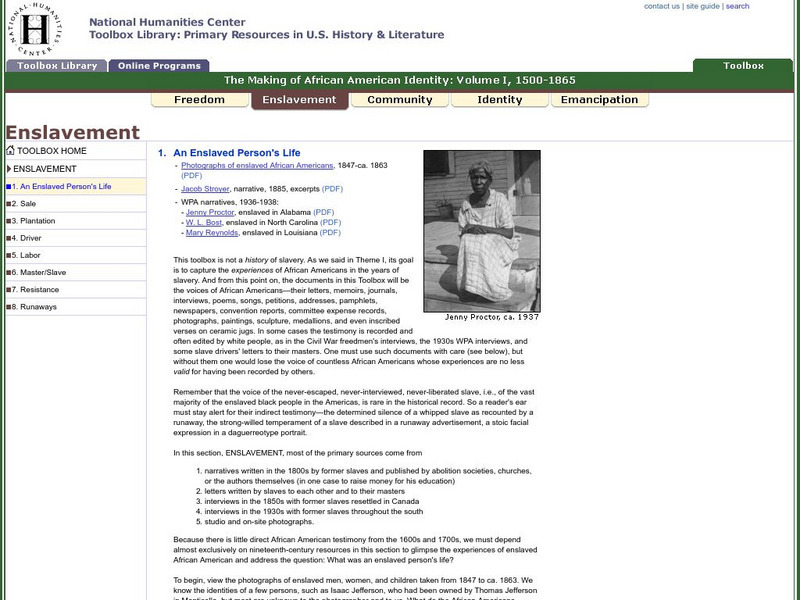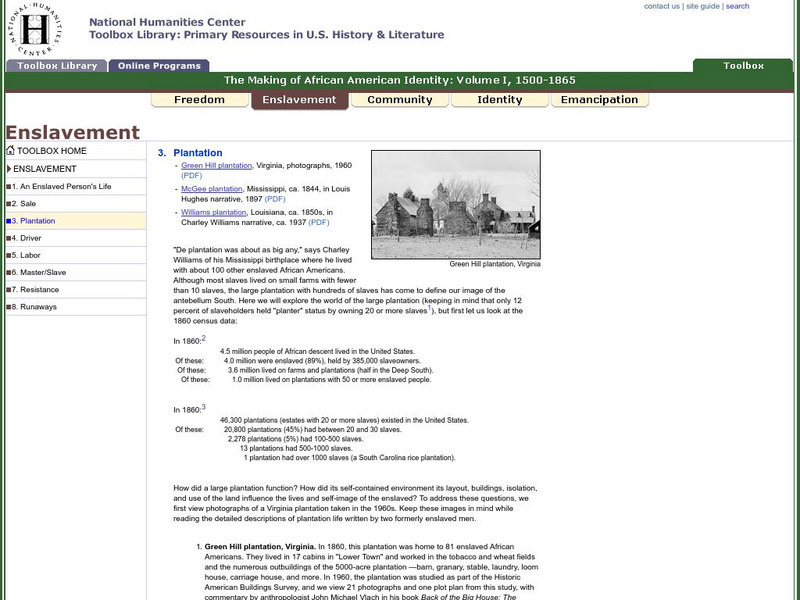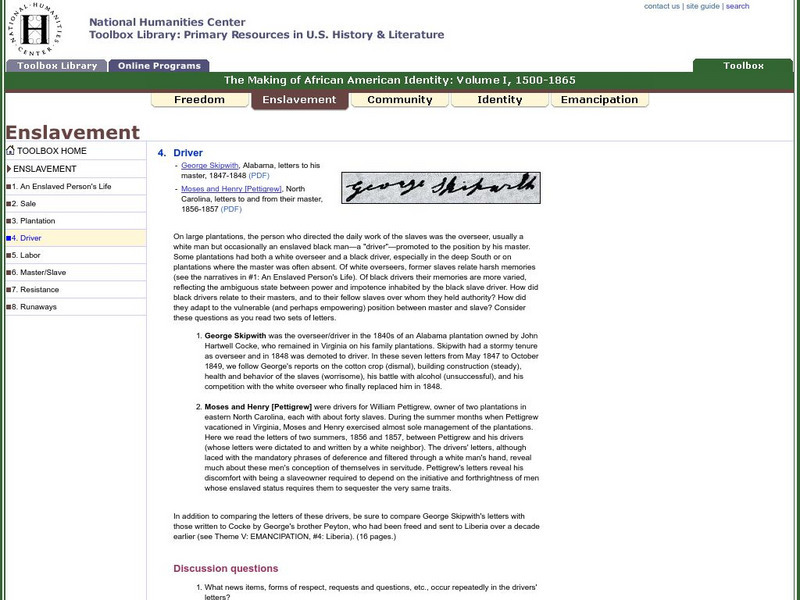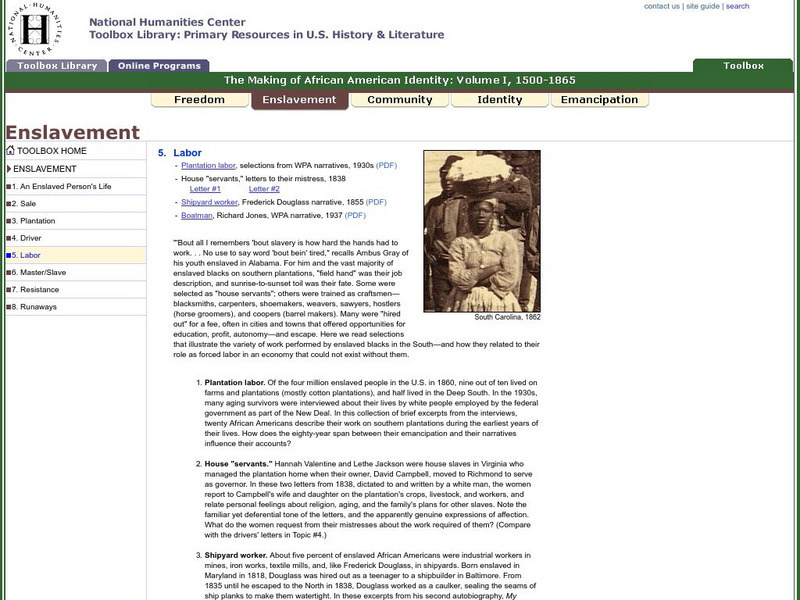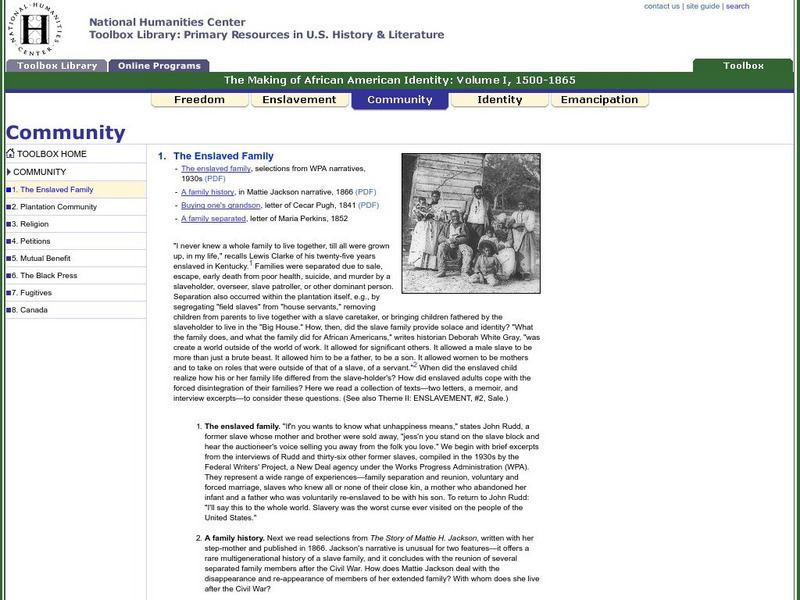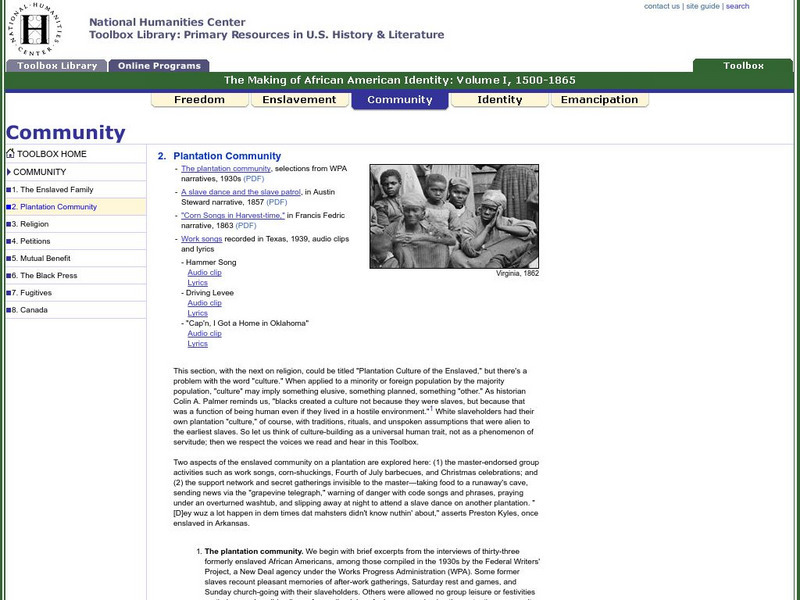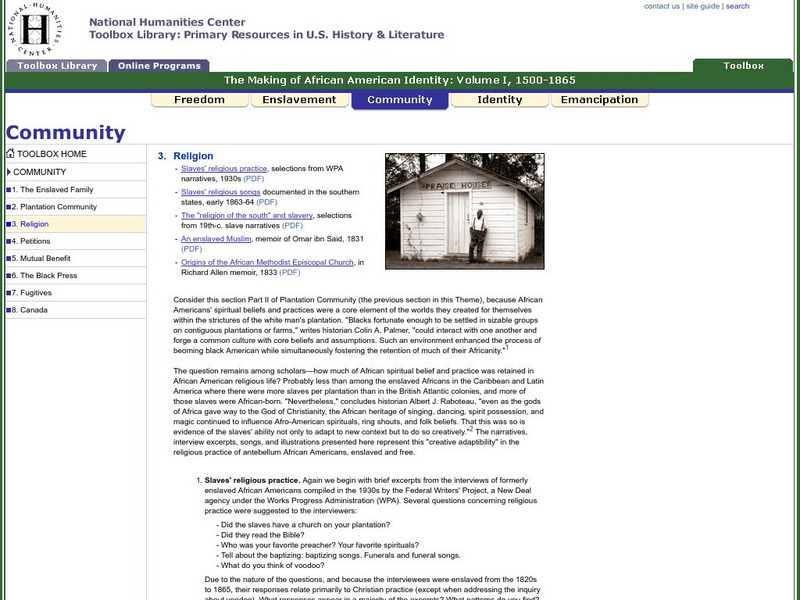Hi, what do you want to do?
Curated OER
Background to the Conflict: Pre-Civil War Days
The American Civil War was a complex test of a relatively young democracy in the mid-nineteenth century. Discuss the events and factors that led to the Civil War with a thorough slideshow presentation.
Curated OER
Woodlawn Plantation-History of Virginia
Fourth graders tour Woodlawn plantation and apply their previous knowledge of the colonial era in order to compare and contrast the roles of farmers (past and present) in Virginia.
Curated OER
Colonial Life in Virginia
Fourth graders compare and contrast life in England with plantation life in America. They study the dependencies or mini-industries that could be found on plantations.
Curated OER
Southern Society during the Civil War: Plantation Society
Students investigate life on Southern plantation during the Civil War era. In this plantation lesson, students research the life of wealthy, white families on Southern plantations and the changes that occured as a result of the Civil...
Curated OER
When Rice Was King
Students examine the origins of rice production in the South. They identify the steps involved in rice cultivation, examine photos of plantation life, conduct interviews, and research the economic base of their own community.
Henry J. Sage
Sage American History: Life on the Plantation in the Ante Bellum South
Article provides an in-depth look at the cruel institution of slavery. The author confronts the mythology of slave life and attempts to find some truth while offering readers a glimpse of slave plantation life in the Ante-Bellum South.
Other
Smithsonian Institution: Remembering Slavery
Gain access to radio and TV broadcasts featuring first-person narratives about being a slave. Learning guides are included online for teacher use.
The Henry Ford
Living Under Enslavement: African Americans on Hermitage Plantation
This virtual tour of the slave quarters of the Hermitage Plantation tells of the family life of slaves, their skills, and their resistance to the institution of slavery.
Other
Mo Ad: Slavery Narratives
A collection of narratives taken from autobiographies, letters and diaries of slaves. Read the text or listen to the haunting stories.
Other
Thomas Jefferson Foundation: Jefferson Monticello: Plantation and Slavery
Click through this site to see who lived at Monticello, what the plantation looked like, and how it operated. Learn about the people who lived there and about the lives of slaves.
Stanford University
Beyond the Bubble: Slave Quarters
[Free Registration/Login Required] Students examine a photograph of former slave quarters in Georgia and answer questions about the living conditions of slaves. They will also observe how the fact that the photograph was taken decades...
PBS
Wnet: Thirteen: The Slave Experience: Living Conditions
This PBS series site reveals the diverse circumstances and living conditions experienced by slaves and indentured servants in America by reading documents dating to the Colonial, Antebellum, and Reconstruction periods.
PBS
Wnet: Thirteen: Slavery and the Making of America: Slave Religion
What religions did slaves bring from Africa to America? This PBS series site provides the historical overview of how early African Americans preserved African spiritual beliefs and practices while enslaved, converted to Christianity, and...
PBS
Wnet: Thirteen: Slavery & the Making of America
Using primary documents, oral histories, and other historical resources, discover how the arts of Africa, Europe, and pre-Civil War America influenced the culture of enslaved African Americans.
University of North Carolina
Documenting the South: Jacob Stroyer, 1849 1908: My Life in the South
This site, from the University of North Carolina, provides the full text of "My Life in the South," the autobiography of an emancipated slave, Jacob Stroyer(1849-1908). The text is complete and in-depth with a full introduction and...
National Humanities Center
National Humanities Center: Toolbox Library: Enslavement, Making of African American Identity: V. 1, 1500 1865
Twenty-eight primary sources-historical documents, literary texts, and visual images-that explore plantation life, the qualities and conditions of slavery, work, and resistance to oppression.
National Humanities Center
National Humanities Center: Toolbox Library: An Enslaved Person's Life, Making of African American Identity
Various photographs of slaves from the pre-Civil War era, an autobiographical narrative of slavery, and three accounts recorded in the 1930s of the lives and conditions of former slaves are included in this large set of information...
National Humanities Center
National Humanities Center: Toolbox Library: Plantation, Making of African American Identity: V. 1
Numerous photographs of a Virginia plantation (taken in 1960), an autobiographical account of life on a Mississippi plantation from the nineteenth century, and an interview with a former slave about a Louisiana plantation recorded in 1937.
National Humanities Center
National Humanities Center: Toolbox Library: Driver, Making of African American Identity: V. 1
Unusual letters from black slave drivers, and in one case, letters in reply from the white slave owner, about crops, labor, and conditions on plantations in the mid-1850s.
National Humanities Center
National Humanities Center: Toolbox Library: Labor, Making of African American Identity: V. 1
Selections of original accounts either written during slavery or recorded in the 1930s that depict work as a plantation laborer, house servant, shipyard worker or boatman.
National Humanities Center
National Humanities Center: Toolbox Library: Community, Making of African American Identity: V. 1, 1500 1865
Twenty nine primary sources-historical documents, literary texts, and visual images-that explore how enslaved individuals and families coped with, adjusted to, maintained communities within, and opposed the system of oppression.
National Humanities Center
National Humanities Center: Toolbox Library: The Enslaved Family, Making of African American Identity: Vol. 1
This site offers two letters and a memoir from the mid-nineteenth century, and interviews from the early-twentieth century, about the importance and the roles of enslaved families.
National Humanities Center
National Humanities Center: Toolbox Library: Plantation Community, Making of African American Identity: V. 1
Various retrospective oral accounts from the early-twentieth century and two narratives from the mid-nineteenth century that examine the work, interrelationships, dangers, and lives of slaves on southern plantations.
National Humanities Center
National Humanities Center: Toolbox Library: Religion, Making of African American Identity: V. 1
A series of songs, narratives, and memoirs that examine the spiritual beliefs of and experiences with religion among slaves in southern plantation communities.














